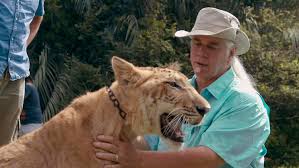The Life and Controversies of Doc Antle

Introduction
Doc Antle, a prominent exotic animal trainer and conservationist, has garnered significant media attention over the years. Known for his appearances in the Netflix series “Tiger King,” Antle’s persona and operations have sparked discussions about wildlife conservation, animal rights, and ethical treatment of animals. The relevance of Doc Antle’s work comes amid broader concerns regarding the exploitation of exotic animals in entertainment and tourism.
Background
Born on March 16, 1960, in Salinas, California, Antle developed a passion for animals at a young age. He founded the Myrtle Beach Safari, a wildlife park in South Carolina, where visitors can interact with exotic animals, including tigers, lions, and elephants. His philosophy claims to emphasize conservation through education and interactive experiences. However, he has faced accusations of unethical practices in the treatment of animals within his care.
Controversies and Legal Issues
Antle’s operations have not been without controversy. He has been scrutinized for alleged violations of the Animal Welfare Act and has faced multiple investigations concerning the conditions in which his animals are kept. In 2020, following the release of “Tiger King,” Antle’s practices came under further examination, leading to calls for reforms in the wildlife entertainment industry.
In 2021, he was indicted on multiple charges related to wildlife trafficking and violations of federal wildlife conservation laws. These charges further fueled the debate about the ethics of using wild animals for entertainment and the responsibilities of those who own and train these animals.
Impact on Wildlife Conservation
Despite the controversies, Antle maintains that his work contributes positively to conservation efforts. He has argued that by allowing people to experience wildlife firsthand, he is inspiring a new generation to care about animal preservation. Antle promotes partnerships with several conservation organizations, stating that a portion of the proceeds from his operations goes toward habitat conservation and efforts to protect endangered species.
Conclusion
The ongoing discussions surrounding Doc Antle illustrate the complex relationship between wildlife conservation, entertainment, and ethics. As legal proceedings continue, the future of Antle’s operations remains uncertain, but his case has sparked important dialogues about animal rights and the ethical implications of wildlife tourism. For readers interested in wildlife conservation, Antle’s story serves as a cautionary tale about the duality of conservation and exploitation in the modern world.









